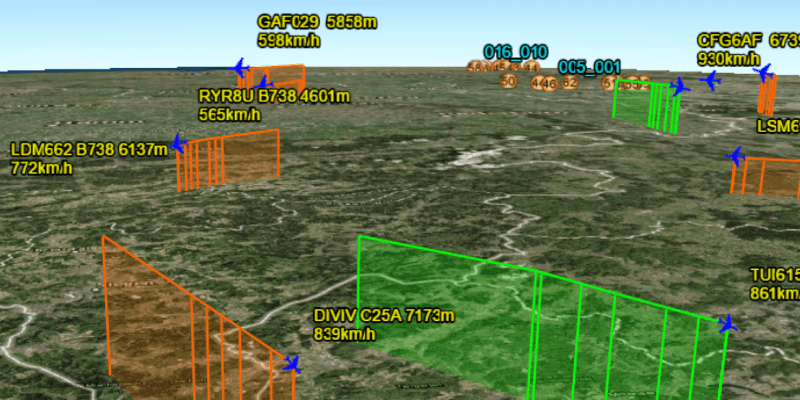Display a file with a KML network link, including displaying any network link control messages at launch.

Use case
KML files can reference other KML files on the network and support automatically refreshing content. For example, survey workers will benefit from KML data shown on their devices automatically refreshing to show the most up-to-date state. Additionally, discovering KML files linked to the data they are currently viewing provides additional information to make better decisions in the field.
How to use the sample
The sample will load the KML file automatically. A network message will be displayed when the dataset is loaded. The data shown should refresh automatically every few seconds. Pan and zoom to explore the map.
How it works
- Create a
KmlDatasetfrom a KML source which has network links. - Construct a
KmlLayerwith the dataset and add the layer as an operational layer. - To listen for network messages, add a
KmlNetworkLinkMessageReceivedListeneron the dataset.
Relevant API
- KmlDataset
- KmlLayer
- KmlNetworkLinkMessageReceivedEvent
About the data
This map shows the current air traffic in parts of Europe with heading, altitude, and ground speed. Additionally, noise levels from ground monitoring stations are shown.
Tags
Keyhole, KML, KMZ, Network Link, Network Link Control, OGC
Sample Code
/*
* Copyright 2018 Esri.
*
* Licensed under the Apache License, Version 2.0 (the "License"); you may not
* use this file except in compliance with the License. You may obtain a copy of
* the License at
*
* http://www.apache.org/licenses/LICENSE-2.0
*
* Unless required by applicable law or agreed to in writing, software
* distributed under the License is distributed on an "AS IS" BASIS, WITHOUT
* WARRANTIES OR CONDITIONS OF ANY KIND, either express or implied. See the
* License for the specific language governing permissions and limitations under
* the License.
*/
package com.esri.samples.display_kml_network_links;
import javafx.application.Application;
import javafx.scene.Scene;
import javafx.scene.control.Alert;
import javafx.scene.layout.StackPane;
import javafx.stage.Stage;
import com.esri.arcgisruntime.ArcGISRuntimeEnvironment;
import com.esri.arcgisruntime.geometry.Point;
import com.esri.arcgisruntime.geometry.SpatialReferences;
import com.esri.arcgisruntime.layers.KmlLayer;
import com.esri.arcgisruntime.loadable.LoadStatus;
import com.esri.arcgisruntime.mapping.ArcGISScene;
import com.esri.arcgisruntime.mapping.BasemapStyle;
import com.esri.arcgisruntime.mapping.Viewpoint;
import com.esri.arcgisruntime.mapping.view.SceneView;
import com.esri.arcgisruntime.ogc.kml.KmlDataset;
public class DisplayKMLNetworkLinksSample extends Application {
private SceneView sceneView;
@Override
public void start(Stage stage) {
try {
// create stack pane and application scene
StackPane stackPane = new StackPane();
Scene fxScene = new Scene(stackPane);
fxScene.getStylesheets().add(getClass().getResource("/display_kml_network_links/style.css").toExternalForm());
// set title, size, and add scene to stage
stage.setTitle("Display KML Network Links Sample");
stage.setWidth(800);
stage.setHeight(700);
stage.setScene(fxScene);
stage.show();
// authentication with an API key or named user is required to access basemaps and other location services
String yourAPIKey = System.getProperty("apiKey");
ArcGISRuntimeEnvironment.setApiKey(yourAPIKey);
// create a scene with basemap style and add it to the scene view
ArcGISScene scene = new ArcGISScene(BasemapStyle.ARCGIS_IMAGERY);
sceneView = new SceneView();
sceneView.setArcGISScene(scene);
// start centered over Germany
sceneView.setViewpoint(new Viewpoint(new Point(8.150526, 50.472421, SpatialReferences.getWgs84()), 2000000));
// create a KML dataset from KML hosted at a URL
KmlDataset kmlDataset = new KmlDataset("https://www.arcgis.com/sharing/rest/content/items/600748d4464442288f6db8a4ba27dc95/data");
// show an alert when any network link messages are received
kmlDataset.addKmlNetworkLinkMessageReceivedListener(kmlNetworkLinkMessageReceivedEvent -> {
Alert alert = new Alert(Alert.AlertType.INFORMATION, kmlNetworkLinkMessageReceivedEvent.getMessage());
alert.setHeaderText("KML Network Link Message");
alert.initOwner(sceneView.getScene().getWindow());
alert.show();
});
// add the KML layer as an operational layer and check if it is loaded correctly
KmlLayer kmlLayer = new KmlLayer(kmlDataset);
scene.getOperationalLayers().add(kmlLayer);
kmlLayer.addDoneLoadingListener(() -> {
if (kmlLayer.getLoadStatus() != LoadStatus.LOADED) {
new Alert(Alert.AlertType.ERROR, "Error loading KML layer").show();
}
});
// add the map view and list view to the stack pane
stackPane.getChildren().add(sceneView);
} catch (Exception e) {
// on any error, display the stack trace.
e.printStackTrace();
}
}
/**
* Stops and releases all resources used in application.
*/
@Override
public void stop() {
if (sceneView != null) {
sceneView.dispose();
}
}
/**
* Opens and runs application.
*
* @param args arguments passed to this application
*/
public static void main(String[] args) {
Application.launch(args);
}
}